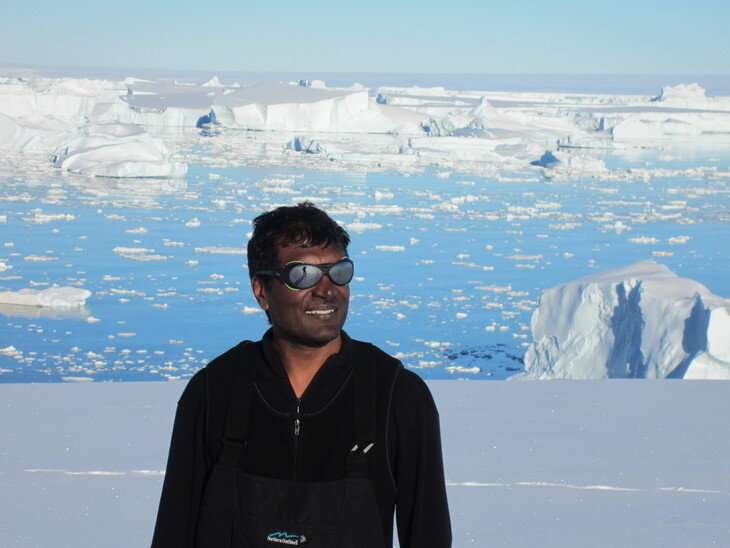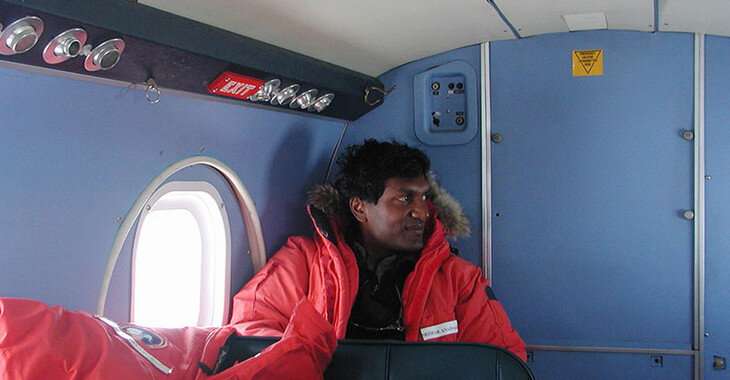Social distancing in Antarctica: You're never really alone

As a glaciologist for over 30 years, Sridhar Anandakrishnan is well-used to social distancing. Professor of geosciences and a core member of Penn State's Ice and Climate Exploration group, his field work in Antarctica and Greenland typically takes place in a small camp in the middle of a glacier, 1,000 miles from the closest neighbor. "For the most part," he says, "it's two to four people living out of a couple of tents for six to eight weeks. There's some very particular skills one needs to navigate that kind of situation."
Anandakrishnan sees parallels between his polar exploits and our current experience of social distancing in the age of COVID-19. In a recent Zoom conversation from his home office, he shared some of the lessons he has learned on the ice.
Q: There are obvious differences between working in Antarctica and home isolation, but even those differences can be instructive. Do you want to start there?
Anandakrishnan: One thing a little different is that quite often the person you're socially isolating with [on a polar expedition] is not a family member. Usually it's someone you know, but not always. So there's the initial navigation phase where you try to figure out what people are like, their schedules and preferences, their biorhythms, if you will—and that's extremely important.
I think that applies here as well. A lot of folks are home all day for the first time with their spouse and kids. And people have their ups and downs through the day and you have to recognize that and account for it.
The second thing, a lot of us are worried about the systems around us. In some ways, in the middle of Antarctica, that's one of the easiest things to navigate. Even though we're a thousand miles away from anybody else, we know there are systems set up explicitly to keep us safe. But the key thing is that all the small groups dependent on that support system have to be responsible themselves, so that when you do need support, that airplane to come in and take you out, you aren't overloading the system.
I think that has parallels to what we're doing here. You have to trust in the systems around you, but you also have to be responsible. That means wearing a mask when you go out, not going out unless you have to, staying distant from other folks so that you reduce the rate of spread of this virus so that the hospitals and medical systems don't get overloaded.
Q: Have you been in situations where the system was seriously tested?
Anandakrishnan: I've been pretty fortunate in not having anything super serious occur, but yeah. There's a few things that help with that. Before you go, everyone has to get a very thorough medical checkup. That acts as a kind of filter.
The second thing is, we've got only one rule: You're never alone. Ever. You're always with somebody, so if anything happens there's somebody there to help you out. You share a tent. You never wander away from camp alone. That's absolutely critical.
Q: Any tips on how to manage that level of togetherness?
Anandakrishnan: Years ago there was a popular book, "All I Really Need to Know I Learned in Kindergarten." It really does come down to saying "please" and "thank you." Remember that you're still part of a social net. Don't just get in your own head. "Please" and "thank you" and "I'm sorry" go such a long way.
Another thing I've found is that everybody needs to have something they own, something they're responsible for. In this situation, maybe make the kids responsible for keeping the place clean or taking the garbage out. I find that incredibly important.
At the end of the day there are people who like to live far out from other folks, to be in a small community, and there are other people who just have a very difficult time with it. That's just human nature. When it happens out in the field, the rest of the community has to support that person and just let them know it's okay. We'll get through this. That's another thing we can tell each other right now.
Q: You've worked in situations where the reality of interdependence is crystal clear. You have to depend on each other, not just to succeed, but to survive.
Anandakrishnan: I think that's a good way to put it. It's not really isolation because we're never alone. Sadly, there are some people in this current crisis who really, truly are alone. They're the ones I feel worst for.

When we're in the middle of our glacier in Antarctica, we have a daily check-in. You pick up the radio every day at whatever time you agreed on, call the main base and let them know: "There's two of us here, we're fine, everything's going well, talk to you tomorrow." If you don't do that, five minutes after your check-in time a whole series of things starts to happen, and 30 minutes after that an airplane takes off and heads out to look for you.
Obviously nothing that dramatic is going to happen here, but I would encourage everybody to pick up the phone and call somebody who you know is alone—or even somebody you haven't talked to since elementary school, someone you want to catch up with. This is a good time for that.
Q: Keeping to a schedule must be key.
Anandakrishnan: Yes and no. There's a French saying, "Man proposes, God disposes." We have a schedule, we go to the field with all the best intentions, and then we get out there and everything goes to heck in a handbasket. The weather intervenes, things break, things change. So you have to have enormous flexibility.
That can be very difficult for people who like to have things the same way all the time. But we're not in that world right now. Things are changing all the time.
You have to give yourself permission to not complete the plan. The weather has come in, the pandemic has hit, I'm not going to get everything done that I wanted to do—that's okay. Then figure out what you can do.
Can I sit in the tent and read a book I've been meaning to read? Listen to a podcast I've been meaning to listen to? Look at data that I've been meaning to look at? Same thing here at home. The schedule is not the same, but let me try to create new structures that I can deal with.
Q: I guess it helps to know that when two months are up, you're coming out.
Anandakrishnan: You're right. That's very different from the current situation. We don't know where the end line is. On the other hand, there's an expression we have out here in Penn's Valley, "The horse can smell the barn." When a horse is trotting home at the end of the day and it gets within a mile or two of the barn, it starts to go faster and faster, more and more impatient to get home.
When you know you have an end date, that last week is really tough. Here we have no deadline, there is no barn. We just have to keep on trotting along and doing our work.
Q: That open-endedness requires a different mindset. What's yours when you first get to a field site and have two months on the ice stretching ahead of you?
Anandakrishnan: In some respects you can't think about two or three months. So you break it up into smaller chunks. What do we have to get done for the next week? What about today?
After a while, you start to lose track of the days, the time of day. You go to a more primitive, cave-like existence. You wake up, it's oatmeal time. You get hungry, it's lunchtime. You get tired, must be dinner time. You get sleepy, must be sleepytime. Those are the four settings on your watch.
Q: Any tips for living that long in a tent?
Anandakrishnan: Well, we [only] spend eight or 10 hours in the tent. For the remaining time we're out in the largest, most magnificent landscape on the planet. Working, walking around, skiing, whatever.
I would encourage folks to leave the house, leave the tent. Go for a walk. That's fine, so long as you stay socially distant. The trees are starting to bud out—go take a look at them. Then go home. That way the tent doesn't seem quite so small.
Provided by Pennsylvania State University




















